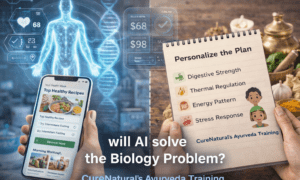Artificial Intelligence (AI) is transforming healthcare by introducing new solutions that improve patient care and streamline medical processes. It enhances diagnostic accuracy and personalizes treatment plans, making it a key part of modern medicine. Advanced tools and techniques allow medical service providers to deliver more effective and efficient services.
As the industry evolves, AI integration aims to tackle significant challenges in medicine, leading to a future where treatments are more precise and accessible.
Here are some current applications and future prospects of AI in healthcare you should know:
-
AI-Powered Diagnostic Tools
AI-powered diagnostic tools are transforming how diseases are detected and diagnosed. With remarkable accuracy, these systems use machine learning algorithms to analyze medical images, such as X-rays, MRIs, and CT scans. For instance, AI can identify early signs of cancer that might be missed by the human eye, enabling timely intervention.
Additionally, AI tools can rapidly process vast amounts of data, speeding up the diagnostic process and reducing the workload for medical professionals. By increasing the accuracy and efficiency of diagnoses, AI is helping improve patient outcomes and streamline medical services.
-
Personalized Medicine and Therapeutic Monitoring
Personalized medicine tailors treatments to individual patients based on their unique genetic makeup and health profiles. AI plays a crucial role in developing these customized treatment plans by analyzing complex datasets to identify the most effective therapies.
In this context, specialized tools like anti-idiotype antibodies are essential. Anti-idiotype antibody services offered by companies like GenScript provide the means to monitor how therapeutic antibodies behave in the body. These antibodies help measure the effectiveness of treatments, ensuring that therapies are safe and effective. By integrating such specialized tools, AI enhances the ability to deliver personalized care, optimizing treatment strategies for better patient outcomes.
-
Drug Discovery and Development
AI accelerates drug discovery and development, significantly reducing the time and cost. Machine learning models can predict how different compounds will interact with targets in the body, identifying potential drug candidates more quickly than traditional methods. AI also assists in simulating clinical trials, allowing researchers to anticipate how drugs may perform in real-world scenarios. This predictive capability speeds up the development timeline and increases the likelihood of successful outcomes. As a result, AI-driven drug discovery is paving the way for new medications that address unmet medical needs and improve patient health.
-
Predictive Analytics for Patient Outcomes
Predictive analytics uses AI to forecast patient outcomes based on historical and real-time data. By analyzing patterns in patient information, AI can predict the likelihood of disease progression, potential complications, and the risk of hospital readmissions. Healthcare providers can use these insights to implement preventive measures, optimize treatment plans, and allocate resources more effectively.
For example, AI can identify patients at high risk of developing chronic conditions, enabling early interventions to prevent or mitigate serious health issues. This proactive approach enhances patient care and helps medical systems operate more efficiently.
-
Virtual Health Assistants and Chatbots
Virtual health assistants and chatbots are becoming increasingly common in healthcare settings, providing patients with accessible and immediate support. These AI-driven tools can handle various tasks, such as answering medical queries, scheduling appointments, and providing medication reminders. By offering 24/7 assistance, virtual health assistants improve patient engagement and satisfaction.
They also reduce the burden on staff by managing routine inquiries, allowing medical professionals to focus on more complex patient needs. Additionally, chatbots can assist in symptom checking, helping patients determine whether they need to seek medical attention. As these technologies evolve, they will play an even larger role in enhancing the patient experience and streamlining healthcare operations.
-
Robotics in Surgery and Rehabilitation
Robotic technology is making significant strides in surgery and patient rehabilitation. AI-driven robots assist surgeons in performing precise and minimally invasive procedures. These robots can handle complex tasks with greater accuracy, reducing the risk of human error and improving surgical outcomes. For example, robotic systems like the da Vinci Surgical System enable surgeons to operate with enhanced dexterity and control, leading to faster patient recovery and fewer complications.
In rehabilitation, AI-powered robots support patients in their recovery process. These robots can provide personalized therapy sessions, adjusting exercises based on the patient’s progress. By monitoring movements and offering real-time feedback, robotic rehabilitation tools help patients regain strength and mobility more effectively. As robotics technology continues to advance, its integration into surgical and rehabilitation practices will further enhance the quality of patient care and streamline medical procedures.
-
AI for Administrative Efficiency
Administrative tasks in healthcare can be time-consuming and prone to errors. AI solutions are streamlining these processes, allowing providers to focus more on patient care. AI-powered software can handle scheduling, billing, and managing electronic health records more efficiently. By automating these tasks, medical facilities can reduce paperwork, minimize errors, and save valuable time.
For instance, AI systems can predict appointment no-shows and optimize scheduling to maximize the use of medical staff and resources. Additionally, AI can assist in processing insurance claims, ensuring billing is accurate and compliant with regulations. By improving administrative efficiency, AI helps healthcare organizations operate more smoothly, reduce costs, and enhance the overall patient experience.
-
Enhancing Medical Imaging and Radiology
Medical imaging and radiology have greatly benefited from AI advancements. AI algorithms can analyze medical images with high precision, aiding radiologists in diagnosing conditions more accurately and quickly. These AI tools can detect abnormalities such as tumors, fractures, and infections that might be subtle or difficult to identify manually.
Moreover, AI enhances the quality of medical images by reducing noise and improving clarity, which leads to better diagnostic outcomes. Automated image interpretation also speeds up the diagnostic process, allowing for timely treatment decisions. As AI continues to evolve, its role in medical imaging will expand, providing radiologists with powerful tools to enhance their diagnostic capabilities and improve patient care.
AI is undeniably transforming the healthcare industry, offering innovative solutions that enhance diagnostics, personalize treatments, accelerate drug development, and improve patient outcomes. From AI-powered diagnostic tools to virtual health assistants, the current applications of AI are making medical care more efficient and effective. Advanced technologies like robotics in surgery, AI-driven administrative tools, and precision medicine are reshaping how medical services are delivered and managed.
Looking ahead, the future prospects of AI in medicine are even more promising. Continued advancements in AI will lead to more sophisticated tools and applications, further revolutionizing medical practices and patient care. However, addressing ethical considerations and data privacy is essential to ensure that AI is used responsibly and equitably. For commercial clients, embracing AI technologies offers the opportunity to stay at the forefront of medical innovation, enhance operational efficiency, and deliver superior healthcare services.



































